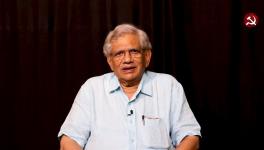A Foreign Hand in Kudankulam or a Failure of Governance?
The Prime Minrster's statement that the Kudankulam stir was due to a few foreign funded NGO's has been followed by the Home Ministry giving notice to 4 NGO's under FCRA and freezing their bank accounts.
The high voltage campaign in the media, launched with the blessings of the Government makes clear that there is no intention of discussing the issue of nuclear energy or safety of nuclear plants. Instead, the dreaded “foreign hand” is being paraded to explain away the questions that are being raised on nuclear energy.
There are three separate issues here, all of which are being mixed up in the current debate. One is the place of nuclear energy in our energy mix and the safety regime that is currently in place for nuclear plants. The second, should NGO's be involved with policy issues at all or should they confine themselves only to education, health, environment, etc. The third is violations concerning the Foreign Contributions Regulation Act (FCRA) – did the NGO's divert money taken for other purposes to the Kudankulam agitation?
All that the Government has claimed till date is that the accounts of these NGO's have not been kept properly and there is a suspicion that these NGO's have violated the FCRA provisions. The Government campaign, while using the FCRA alleged violations as a peg, have however sought to tar all opposition to nuclear energy or questioning the safety of nuclear plants as “anti-national” and working at the behest – wonder of wonders – the Unites States! This from a Government which has sought an implicit strategic alliance with the US, has damaged its energy security by following the US dictated policies on Iran, and has cravenly given in just the other day to the US pressure in the UN Security Council on Syria.
The FCRA is quite clear. If you take foreign funding, there are a host of things you cannot do, agitations certainly being one of them. So if any organisation wants to involve itself in agitations for opposing government policies, it should not take foreign funds. Nor should organisations who have taken grants or donations from any source – foreign or Indian -- divert it for another purpose. If any NGO has violated these principles, the Home Ministry has provisions of FCRA under which it can proceed against such organisations. Time will show whether what the Government is claiming is correct or what the organisers are saying – that no such diversion has taken place is true.
However, this is a small issue. The much bigger issue is the kind of opposition that has now sprung up after Fukushima and the way the Government is going about conducting its policy debate on nuclear energy.
If we remember the debate that took place during the India US nuclear deal, it was widely touted by Manmohan Singh and other UPA leaders that all that India had to was to sign the 123 Deal with the US and nuclear energy would start flowing into the grid almost instantaneously. Power cuts would disappear and Kalavati in drought hit Vidarbha would be 'empowered” with electricity, so said Rahul Gandhi, the “crown prince”. More than three years have elapsed since then, Kalavati still remains dis-empowered. The share of nuclear energy has actually gone down, with Jaitapur and Kudankulam are mired in controversy. We still have no figures of the current cost of the Kudankulam plant, the only figures being bandied about being the 2001 cost figures. For Jaitapur, a contract has been signed between Nuclear Power Corporation and Areva, the supplier, which by the Areva's President's admission is being kept secret at India's behest.
Nuclear energy is not just about safety, it is also about cost. In a way, safety also feeds back into the cost of the nuclear plants – the more we put in safety measures, higher the cost. In television debates, the Ministers and spokespersons of UPA spout about nuclear power being cheap and abundant. Figures of 50,000 MW are bandied about. All of this, without a proper evaluation of the costs of various sources of energy, nuclear being only one of them. No such policy document still exists on the cost of various energy options and what is the energy mix we should have.
Lately, a new argument has been added, lack of coal. This argument is patently dishonest as the policy makers know full well that the shortage of coal is not because India does not have enough coal reserves, but because we are unable to bring it out and supply it to power stations. We have not made the investments in coal mines and railways – that is why we have a coal shortage.
It is true that Kudankulam has a number of safety features, some of them for example missing in Fukushima. The fact remains that the Atomic Energy establishment in the country today lacks credibility when it comes to safety. The Atomic Energy Regulatory Board (AERB) is subservient to the Atomic Energy Commission and therefore lacks the independence it needs to impose safety on the nuclear plants. Former Chairperson of AERB, A.Gopalkrishnan had raised a number of questions regarding safety of India's nuclear plants including why the Safety Audits conducted by AERB earlier are still being secret.
The proposed Nuclear Energy Safety Authority is now before the Parliament. Even here, the Bill has been drafted in a way that the Government can override the Nuclear Safety Regulator. It is this lack of independent oversight of the nuclear plants which make people question their safety.
I do believe that nuclear plants can be made safe. Neither would I advocate giving up nuclear energy completely. But without an independent regulator and a far greater degree of transparency in the nuclear regime, questions will always remain. Once we have decided to separate civilian and military facilities, there is no reason why secrecy should be all pervasive that it currently is. Why should even cost figures of proposed nuclear plants be treated as state secrets?
It makes strange reading when the prime minister of the country confesses that his government and the nuclear establishment put together do not have the credibility to convince the people of the area near Kudankulam regarding the safety of the plant. A rag-tag band of NGO's funded from abroad has more credibility than the entire Government including the PM? Is this not a cause for shame ? And introspection? Is it not a complete failure of governance?
The other issue is the role of NGO's The Government seems to be arguing that NGO's should not oppose government policy, if they are foreign funded. Here is a Government which has been soliciting foreign funds for every sector in the economy, has been fully backed by foreign capital, has allowed US and Israeli intelligence agencies to penetrate its security apparatus officially, allows “strategic” think tanks to create economic and foreign policy with foreign funds. Its only problem is with NGO's that are opposing government policies. What is the difference between the US companies opposing India's nuclear liability laws, or patent laws and international NGO's with their Indian counterparts campaigning against policies?
The problem with this Government is that it wants its policies to be selectively applied. Westinghouse and GE campaigning against Indian policies and laws is OK, but not NGO's opposing nuclear power. Monsanto can campaign for GM crops, but foreign funded NGO's can't oppose Monsanto. A Walmart can campaign for opening up retail to foreign capital but groups opposing Walmart in the US should not extend their activities here. What is sauce for the corporate gander is not sauce for the NGO goose. Globalisation of capital is to be welcomed but not globalisation of dissent.
The worst excesses of foreign funding in India is not on issues where there is a world-wide debate – such as GM crops or nuclear energy. It is in the murky world of strategic policies and arms trade. A huge number of “think tanks” have sprung up in the last two decades. They conduct strident “advocacy” for India to align with the NATO, appear as “experts” in the media and argue for a rightward shift in India's foreign policy. They also are the refuge of senior armed forces figures after retirement. If we examine their funding, most of their funding comes from the Government of NATO countries, who not only have an obvious interest in India abandoning its independent foreign policy but also provide a huge market for their armaments industries. In the US, they would have to register as lobbyists for foreign countries. In India, they masquerade as NGO's.
Undoubtedly, the NGO sector is complicated. There are pro government NGO's, corporate NGO's, NGO's aligned with foreign governments and NGO's that believe in a set of issues for which they raise money and here and from abroad. By raising the bogey of foreign funded NGO's, Manmohan Singh and his Government is creating a straw man they can attack safely. It is doubly dishonest as the intent here is not to build an indigenous nuclear energy sector but to hand over the Indian market to foreign companies.
Without squarely addressing the policy issues on nuclear energy -- both cost and safety --the country will find it enormously difficult to take its nuclear energy policy forward. The time in which a few experts could convince the people of what is the right way forward is gone. This government and its experts have neither the credibility nor the integrity with which they can carry the people. And it cannot wish away its lack of credibility by raising a “foreign hand”.
Get the latest reports & analysis with people's perspective on Protests, movements & deep analytical videos, discussions of the current affairs in your Telegram app. Subscribe to NewsClick's Telegram channel & get Real-Time updates on stories, as they get published on our website.
























